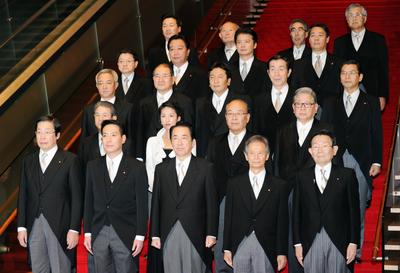Although both Ohata and Kaieda belong to the Hatoyama group within the DPJ, which threw its weight behind Ichiro Ozawa in the September 2010 leadership election, Kaieda had previously signalled his positive commitment to Japan’s membership in the TPP by asserting that accession to the TPP is essential for Japan’s economic revival. He has also committed himself to the prime minister’s June 2011 deadline for the government’s final decision on the matter. On the day he was appointed to his new post, Kaieda said: ‘It’s historically inevitable for us to open Japan to the world. We’ll step up efforts during consultations on the TPP so that Japan can take advantage of rapid growth in Asia to spur the growth of the domestic economy.’
Equally important is the fact that Kaieda will provide more ballast against the protectionist stance of Michihiko Kano, the Minister for Agriculture, Forestry and Fisheries, whom Kan has retained. With Kaieda’s appointment, Prime Minister Kan has successfully positioned his cabinet for reform in Japanese trade policy.
The pro-TPP stance of the new METI Minister is not surprising. Kaieda represents the Tokyo (1) seat, one of the most urbanised lower house electorates in the country. His constituents care about reviving the Japanese economy and administrative reform, and are mostly disinterested in supporting the uncompetitive agricultural sector.
Kaieda’s strengths are in economic analysis and financial affairs, and there is every reason to believe that he will be an important player in setting policy. Indeed, Kaieda has a substantial background as a party policymaker. He became head of the DPJ’s Policy Affairs Research Council (PARC) in 2002, and then Chief Cabinet Secretary in Hatoyama’s fourth ‘Next Cabinet’ when in opposition. In 2004, he became METI minister in Okada’s ‘Next Cabinet’. Later, in recognition of his expertise in economics and financial affairs, he became State Minister for Economic and Fiscal Policy in Kan’s cabinet when Kan was re-elected prime minister in September last year.
The big question mark hanging over Kaieda is his relationship with Ozawa. He is generally known as an Ozawa supporter — and last June he was briefly considered as a possible challenger to Kan with Ozawa’s backing. However, like Haraguchi Kazuhiro (the former Minister for Health, Labour and Welfare in Hatoyama’s cabinet), his bid for the DPJ leadership was considered premature. Ozawa’s group of supporters certainly explored with Kaieda the possibility of running as DPJ leader against Kan, but only Shinji Tarutoko ended up contesting the leadership ballot. Ozawa has also backed Kaieda in the past, appointing him to the post of chief of the party’s political reform headquarters when Ozawa was in charge of party personnel appointments as DPJ Secretary-General in 2009-10. Likewise, Kaieda, taking his lead from the Hatoyama group, backed Ozawa against Kan last September. Kaieda’s financial and political loyalties are certainly to the Hatoyama group because he has received significant financial support from Hatoyama in the past — Kaieda is particularly indebted to Hatoyama for reviving his career in the 2009 lower house election after his defeat in the pro-Koizumi surge of 2005.
Yet Kaieda has shown himself capable of about-turns on policy in an anti-Ozawa direction. Even though he was State Minister for Economic and Fiscal Policy at the time, Kaieda was largely excluded from the compilation of the DPJ’s fiscal 2011 budget because he was considered to be an advocate of fiscal spending and too close to Ozawa, who was of the same mind. However, Kaieda aligned himself more recently with Kan’s position on the consumption tax, stating that a future consumption tax increase is ‘unavoidable’, provided that, in a deflationary economy, sufficient consideration is given to timing and how it is done — which is certainly not Ozawa’s position. Elsewhere, Kaieda has also expressed his support for a ‘gradual’ consumption tax increase.
Aurelia George Mulgan is Professor at the University of New South Wales, Australian Defence Force Academy in Canberra.

